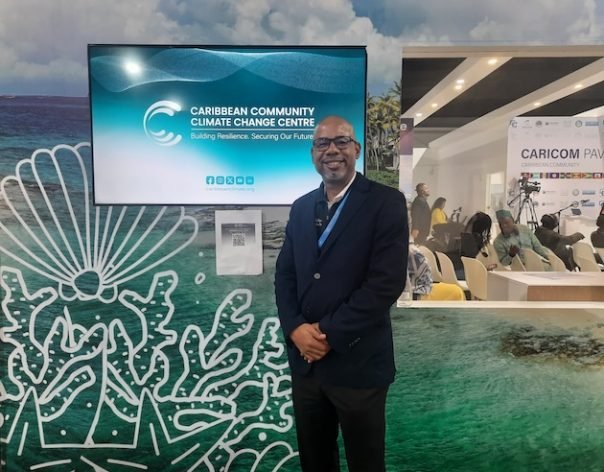
BAKU, Nov 18 (IPS) – Communities dwelling in Small Island Growing States (SIDS) pay the worth of local weather change in lives, livelihoods, and stunted sustainable growth.
Representatives from Caribbean islands have repeatedly expressed this ongoing concern at COP29.
Dr. Colin A. Younger, Government Director of the Caribbean Group Local weather Change Heart (CCCCC), reemphasized the catastrophic outcomes of the failure to fulfill emissions targets.
“What Hurricane Beryl demonstrated to the world is what occurs when there’s failure to fulfill the emission discount goal. To fulfill the temperature objective of the Paris Settlement requires a 43 p.c discount of greenhouse gases by 2030, a peak of fossil gasoline manufacturing by 2025 and internet zero commitments by 2050—with out attaining these targets, we proceed to face elevated frequency and depth of hurricanes and different climate-related disasters. Massive nations usually fail to know how such occasions devastate small economies, wiping out important infrastructure—faculties, healthcare, telecommunications, roads, and farms—paralyzing complete communities.”
As a substitute of a wealthy future, the futures of the youth are in jeopardy.
“Our younger persons are inheriting a future the place they can not attain their full potential due to climate-related impacts. In some circumstances, it units progress again by years, and in others, by a long time.”
Younger mirrored on the devastating financial toll of the local weather disasters—successfully bankrupting small economies, leaving them considerably extra susceptible.
“Now we have witnessed the dimensions of destruction hurricanes can inflict. Hurricane Maria worn out 226 p.c of Dominica’s GDP and two years earlier, Tropical Storm Erika had already devastated 90 p.c of its GDP,” he stated. “This can be a matter of survival for our nations and the failure of the developed nations to do extra sooner to curb emissions in keeping with the science.”
Morally Unjust, Bureaucratically Complicated
Developed nations want to come back to the get together.
“G7 and G20 nations are chargeable for 80 p.c of all emissions. But, the burden of offering sources, know-how transfers, and capability constructing falls disproportionately on others—a morally unjust actuality we’re confronting.”
Speaking about finance and the New Collective Certified Purpose (NCGQ), a significant final result SIDS expects to come back out of COP29, Younger stated he’s involved whether or not or not the NCQG will meet the wants of SIDS.
Younger criticized the inefficiency of the present worldwide local weather finance system.
“The present worldwide local weather finance structure shouldn’t be serving the wants of small island creating states. It’s too bureaucratic, advanced and troublesome to entry.”
He highlighted the disparity in funding distribution.
“Take the Inexperienced Local weather Fund for instance. Out of the USD 12 billion permitted, solely 10 p.c has gone to Small Island Growing States, and inside that, the Caribbean has obtained lower than USD 600 million. If sources from the New Collective Quantified Purpose (NCQG) comply with the identical disbursement patterns, it is clear it will not serve our pursuits to fulfill the dimensions and velocity of the pressing adaptation wants of our nations.”
Radical Change Wanted For Local weather Financing
Piecemeal change won’t work for SIDS, he informed IPS.
“For Small Island Growing States, the system of accessing local weather underneath the NCQG and Loss and Harm Fund can’t resemble the prevailing monetary structure. We’d like a finance mechanism that’s streamlined, equitable, fit-for-purpose and actually conscious of our distinctive challenges.”
“There’s a vital lack of transparency within the local weather finance area as a result of developed nations proceed to stymie efforts to obviously outline what constitutes local weather finance underneath the Paris Settlement.”
Financing usually comes as loans, and this has implications for SIDS. Lately, for instance, the European Funding Financial institution (EIB) signed a Euro 100 million (USD 109.4 million) mortgage settlement with the Caribbean Islands.
Younger highlighted the continuing points with local weather finance transparency and the readability on financing phrases
“Sure sorts of investments, particularly non-concessional loans, shouldn’t be counted as local weather finance underneath the Conference. After we speak concerning the USD 100 billion annual goal that developed nations have dedicated to since 2009, there’s widespread disagreement amongst creating nation events on whether or not it has been met. The OECD claims it has, however creating nations argue that the funds are usually not seen or are troublesome to trace due to lack of transparency.”
Younger expressed concern over the mounting debt burden positioned on SIDS due to local weather change.
“What we’re more and more seeing is that we’re being requested to shoulder a debt burden that’s already alarmingly excessive—nicely above World Financial institution and IMF benchmarks.”
He highlighted the cyclical nature of the disaster.
“We’re pressured to borrow to construct resilience, however even inside the mortgage reimbursement interval, we’re hit by a number of disasters once more. It is a vicious cycle that leaves us unable to recuperate, exacerbating our debt stage.”
When requested a few single key negotiation or message to take ahead from COP 29, his response was clear:
“The message is that we’d like higher ambition from developed nations to chop emissions in keeping with the science. And past that, they need to ship on the guarantees they’ve made to ship finance at scale, adaptation finance, know-how and capability constructing to creating nations, significantly to SIDs and LDCs.”
IPS UN Bureau Report
Comply with @IPSNewsUNBureau
Comply with IPS Information UN Bureau on Instagram
© Inter Press Service (2024) — All Rights ReservedUnique supply: Inter Press Service



